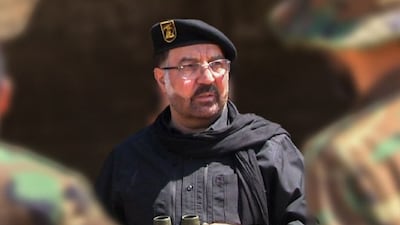The US on Wednesday denied any involvement in the death of Hamas political chief Ismail Haniyeh in Tehran or in an Israeli strike on Beirut that killed a Hezbollah commander.
“The United States was not aware of or involved in the apparent death of Hamas leader Ismail Haniyeh,” US deputy ambassador to the UN Robert Wood said during an emergency meeting of the Security Council, requested by Iran.
He also noted that Washington has had no independent confirmation of Hamas’s claims regarding his death.
Mr Wood urged security council members with direct influence over Iran to increase pressure on the country to “stop escalating its proxy conflict against Israel”.
China, Russia, Algeria and other council members condemned Mr Haniyeh's assassination, while the US, Britain and France highlighted concerns over what they described as Iranian support for destabilising forces in the region.
Russia’s deputy ambassador Dmitry Polyanskiy said those responsible for the “political assassination” of Mr Haniyeh must have been aware of the dangerous consequences for the entire region.
“This is a serious blow, primarily to mediation negotiations between Hamas and Israel focused on a ceasefire in the Gaza Strip, and Ismail Haniyeh was a direct participant in this,” Mr Polyanskiy said.
China’s ambassador Fu Cong called the assassination of Mr Haniyeh “a blatant attempt to sabotage peace efforts” which have yet “to yield any progress”.
“While the spillover effects of this conflict are increasingly visible … this situation is hanging by a thread,” said Mr Fu.
Iran’s UN envoy Amir Saeid Iravani called on the Security Council to take "immediate steps to hold Israel accountable for this act of aggression,”
He emphasised that the United States, as Israel's "strategic ally and main supporter," cannot be overlooked in this “horrific crime”.
Mr Iravani asserted that the assassination “could not have occurred without the authorisation and intelligence support of the US”.
He said that Israel was pursuing a political goal by killing Mr Haniyeh, “aiming to disrupt the first day of the new government of the Islamic Republic of Iran”.
The Hamas political leader had travelled to Tehran to attend Tuesday's swearing-in of Masoud Pezeshkian as President of Iran.
Despite Israel’s provocations, Iran has “consistently exercised maximum restraint”, said Mr Iravani.
The killing of Mr Haniyeh came after a strike on a Beirut suburb that killed Hezbollah commander Fouad Shukr.

Mr Wood also insisted that Israel acted independently in the Beirut strike, which was a response to Hezbollah's July 28 attack on Majdal Shams.
The attack on the area of the occupied Golan Heights killed 12 Druze children.
The Beirut strike also killed five civilians – three women and two children – and injured dozens, according to Lebanon's Health Ministry.
Reaffirming Israel’s right to defend itself, Mr Wood noted that Hezbollah has repeatedly fired rockets at Israel since October 8 “with Iran’s support and backing”.
“A broader war is neither imminent nor inevitable, although the opportunistic attacks by Iran and its network of terrorist proxies and partners across the region have repeatedly brought us closer to a regional conflict,” he said.
Prime Minister Benjamin Netanyahu on Wednesday warned Israeli citizens to brace for difficult days ahead.
“Israel will exact a very heavy price for aggression against us from whatever quarter,” Mr Netanyahu said in a televised address.
Vali Nasr, professor of international affairs at John Hopkins University told The National that the timing of Mr Haniya’s assassination signaled that a ceasefire is not a priority for Israel.
"It was escalatory countering the deescalatory direction that ceasefire has to take things.”
While violence continues unabated in Gaza after months of relentless diplomatic efforts, the situation across the border in Lebanon is also on an increasingly worrying path.
In a letter to foreign diplomats made public on Tuesday, Israeli Foreign Minister Israel Katz said that his country “is not interested in all-out war”, but that the only way to avoid it would be to fully enact a 2006 UN resolution that establishes a demilitarised zone along Israel’s border with Lebanon and an end of hostilities with Hezbollah.
Lebanon's charge d'affaires, Hadi Hachem, said implementing the UN resolution would mean Israel “must withdraw from lands that it continues to occupy, that Israel must stop its violations of Lebanese sovereignty by ground sea and air”.
He accused Israel of attempting to escalate the conflict in the region, potentially leading to catastrophic outcomes.
“As we have said so before and we reiterate today, Lebanon and the people of Lebanon and the government of Lebanon do not want war,” Mr Hachem said.













